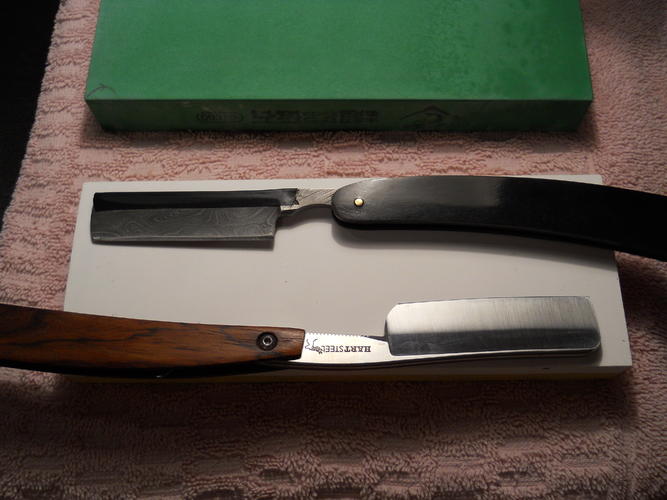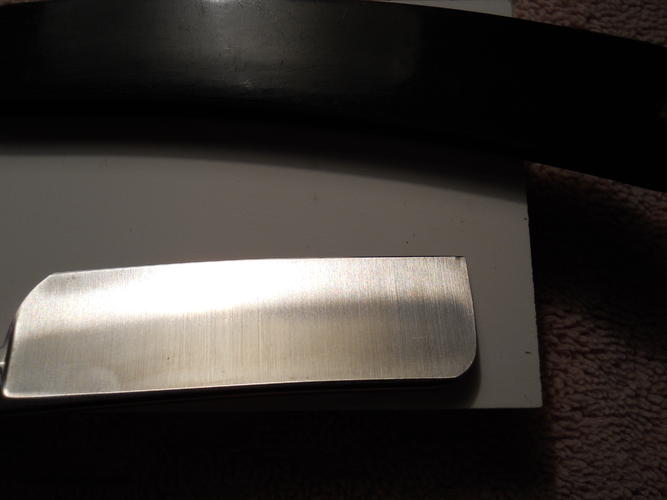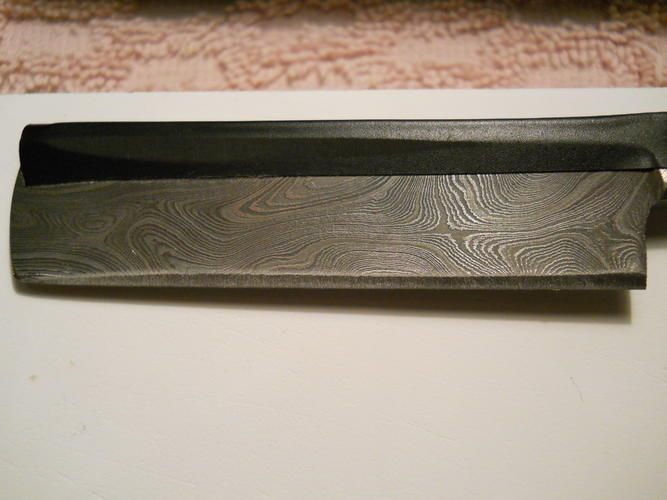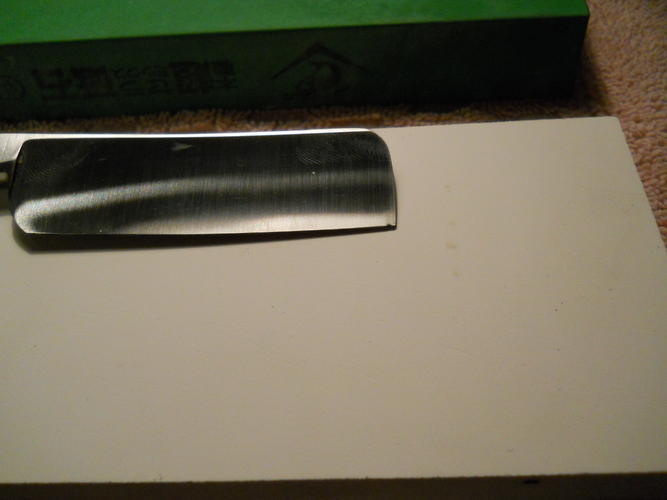Results 1 to 10 of 18
-
09-27-2013, 01:34 PM #1Junior Member

- Join Date
- Sep 2013
- Posts
- 5
Thanked: 0 In need of information on lapping and honing for a first timer
In need of information on lapping and honing for a first timer
I have been searching threads of forums all night and can't find the advice/answers to my questions.
First and most important is my recent purchase of a Naniwa Chosera 1000 k, a Norton combination 4k/8k, a Naniwa superstone 220 grit, a Naniwa Superstone 12k, and a Norton flattening stone to maintain them all.
After watching a Lynn Abrams video on how to lap my stones, specifically the Norton 4k/8k. the advice he gives is that on average a brand new Norton 4k/8k will need to be lapped down an eighth of an inch in order to get past the initial graininess to achieve a quality hone.
1. My question is will the same distance of lapping be necessary to administer to all my listed above stones?
I purchased these honing stones in order to repair my expensive hart razor that I unfortunately chipped on the sink while carelessly rinsing the razor after a shave.
2. Are the combination of stones I posses able to repair my mistake effectively? or did I make a mistake on my recent honing investment?
3. How do I know if I ruined my Chosera 1000 k? During my pitiful attempts to restore my razor and set the bevel correctly, my Chosera was constantly exposed to water for a period of time of at least 5 hours. I followed the directions by letting it air dry and to not speed up the process with a towel or blow dryer. However the stone still appears to be wet on one side and now has a dark spotty coloration.
I've been practicing my honing skills on a cheap very dull vintage razor I obtained from a thrift store but as of yet see little to no positive progression at even achieving even a chef knives sharpness. Until I am confident in my ability to properly hone I don't plan on attempting a repair on my hart razor.
I'm very discouraged and am in need of quality advice on honing. I'm eager to research and learn to perfect this skill in order to rationalize my recent honing stone purchase. Please advise me. Presently I feel I've made a mistake investing in a set of honing stones rather than hiring someone to just fix my stupid avoidable mistake.
Educate me and help me to realize I made the right investment.
Thank youLast edited by scrambowlz; 09-27-2013 at 01:48 PM.
-
09-27-2013, 01:46 PM #2

I guess my first question would be how bad is the chip? Can you show pics? A lot of times you can hone out small chips on a 1k with no problems. I have a Heljestrand MK31 that had a small chip in the edge, and I was able to hone past it by doing several sets of circle strokes with pressure on the 1k.
The setup you chose is definitely a good one. You should have everything you need to get you razor to shave well. I'm just trying to keep you from having to drop down to that 220 if you don't have to...That's awful harsh for a razor IMHO....Hopefully you don't need to go down that low...-JP-
-
09-27-2013, 02:12 PM #3

1. The Norton 4k needs to be lapped down more than other stones to reach the quality grit level to which Lynn is probably referring. The 4k does seem to improve with more lapping; however, a full 1/8 " is more than I needed to go. The other stones will not require this much lapping.
2. You have the right stones to do almost anything. You may want to post a picture of the chip, but it is likely that you can repair it. You will need to stay on the low grit 1000 stone until the chip is gone. If the chip is very deep then you can save some time by pulling the edge along the SIDE of your 1000 stone until you can barely feel the knick by running your fingernail along the edge. Then go to the 1000 to set your bevel (it should cut hair on your arm before moving on) and finish the honing progressively or with Lynn's pyramid steps. Most newbies move on too quickly before the bevel is set.
3. Don't worry about the discoloration. You need to lap this side until it is gone. The stone should be fine.
Hang in there. Keep practicing. This is a challenging hobby, but it can be a very rewarding journey.
-
09-27-2013, 02:25 PM #4

1. Only the norton will need the 1/8 lapping. All the other is just till flat.
2. The stones are good but wood get a dmt d8c for lapping as those lapping stones aren't great and you need to lap it to start out with.
3. The discolouration could be swarf. Clean the stone under running water using your hand like a lap. If it comes out good if not lap it a little but really shoudln't cause an issue
Honing can take a bit to learn. Watch the vids by Gssixgun and Lynn Abrams on youtube. Good luckMy wife calls me......... Can you just use Ed
Can you just use Ed
-
09-27-2013, 03:26 PM #5

I agree with everything that's been said so far. Honing a razor is one thing, repairing a chip is another. It takes a bit of skill and practice. I'd send the Hart out to be repaired. If you've never done it, I wouldn't start the learning process on a $300.00 razor. When I repair a chip, I lift the spine off the stone, and hone at an angle, almost like you'd sharpen a knife. It's quick and effective. In any case, You have the right tools for the job. I'd practice on a inexpensive razor first.
We have assumed control !
-
09-27-2013, 04:05 PM #6At this point in time...




- Join Date
- Jun 2007
- Location
- North Idaho Redoubt
- Posts
- 27,206
- Blog Entries
- 1
Thanked: 13250
There are 3 different Norton 4k's out there floating around
Made in USA
Made in Mexico
Made in Italy
There were some that came out when production shifted from the US to Mexico that required the 1/8 inch lapping or so to get to a smooth even feeling surface ,
Most of those issues have since been fixed, Lap until the stone is flat and the feel is even so that there are no rough spots left, how long that takes will differ with each Hone
I seriously doubt you did damage to the Chosera, set it on a towel to dry slowly when yer done honing, there are rare days that mine isn't wet for hours...
-
09-27-2013, 04:28 PM #7This is not my actual head.



- Join Date
- Nov 2009
- Location
- Middle of nowhere, Minnesota
- Posts
- 4,624
- Blog Entries
- 2
Thanked: 1371
The surface of my Chosera 600 has several spots and different colors, and generally looks bad.
It works great.
Strange women lying in ponds distributing swords is no basis for a system of government.
-
09-27-2013, 09:20 PM #8Junior Member

- Join Date
- Sep 2013
- Posts
- 5
Thanked: 0
thank you for the tips I measured the Norton 4k/8k I have lapped it nearly a 16th of an inch so far, still has a little uneven graininess so I will continue to lap that again. Oh and the Norton was made in Mexico if that's significant.
the advice about my Chosera is a relief :-)
I'm a very scientific individual and am curious if types of water used plays a role in honing as well as temperature. I live in a home with hard water. Would soft water make a difference also how about distilled?
I like Lynn's videos but was unaware of Gssixgun thank you for the new resource eddy.
My digital camera doesn't have great resolution to show the chip on the hart but here are the photos.
The chip or indentation occurred at the razors toe. I have not attempted a repair on the hart and probably wont for sometime until I feel I'm ready and confident.
the fine established bevel is non existent on my cheap half hollow Damascus razor. Will the bevel be visible after the chosera 1k stage or is that something that shows up after finishing on a polish stone like my 12k?
currently I am practicing honing on the Damascus steel razor that I purchased in a package deal.
its has become dull since I first learned to shave with it and in my opinion even duller after my marathon of honing attempts last night. It doesn't want to travel or even come close to cutting my thumb pad. believe me I've applied hard pressure and kind of wanted it to cut. I just miss shaving so much.
one more thing I have read that for beginners honing slowly works best and that on the chosera that cuts well and fast it should be effective. is this info true? how much pressure should I apply I am the most confused about how much pressure to apply.
I hope the pictures are clear enough to attain a good assessment on my problems with both the chipped/warped hart and the dull Damascus.
I apologize for the disorganization and multiple questions however I am extremely eager to produce a successful bevel and hone. its all I think about.




Last edited by scrambowlz; 09-27-2013 at 09:22 PM.
-
09-27-2013, 11:06 PM #9At this point in time...




- Join Date
- Jun 2007
- Location
- North Idaho Redoubt
- Posts
- 27,206
- Blog Entries
- 1
Thanked: 13250
-
09-28-2013, 12:17 AM #10

I'm not sure how you define 'bevel' as I can see a bevel forming on the damascus. What's happening at the edge may be a different matter tho as we have no idea what kind of heat treatment it had if any. It's bevel is pretty large & heavier at the heel but as you are honing it with tape you may simply be following the shape of the spine. Usually tape on a razor produces a smaller bevel so I think the geometry on this blade is wrong or you have been bearing down hard on it.
Pressure is a variable thing & I find it difficult to quantify because different parts of the razor will have different pressure on them. If you want to hone a microchip from the edge of a blade, the lightest pressure will put that edge in contact with the stone. If you are restoring an edge that needs a lot of steel removed some pressure will help as your goal is to thin out the steel behind the original bevel as you create a new one. Just remember that too much pressure will flex your edge away from the hone or in the case of a wedge maybe chip the edge. The stone will do the job for you.
I would say it would not take terribly long to correct that Hart on the 1k but they are pretty hard steel. You can hone it with a taped spine as I believe they come that way from the factory. Make sure your stroke contacts the whole edge as they have a slight smile.
I think the same advise given for stopping applies for honing. Just enough pressure to keep contact with edge & spine but when honing a little torque into the edge will save spine wear.The white gleam of swords, not the black ink of books, clears doubts and uncertainties and bleak outlooks.


 3Likes
3Likes LinkBack URL
LinkBack URL About LinkBacks
About LinkBacks






 Reply With Quote
Reply With Quote



